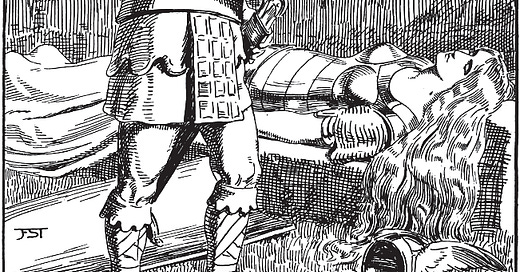Brunhilda and Siegfried : Siegfried Finds Brunilda 2/2
The final part of the seventeenth tale from Myths & Legends
Presently Siegfried saw, standing motionless under the trees, a stately horse. On going nearer, he was astonished to find that on his feet were wings. His eyes were closed in profound sleep. Siegfried stroked his flowing mane. “Awake good steed! The sun has arisen. This is no time for sleeping.” His voice rang out clear as his silver horn, and with a start, Grani awoke.
But Siegfried looked around in vain for the bride—Brunhilda. Suddenly the rising sun struck with its glittering light on an object under a distant pine. Siegfried hastened forward, and with wonder beheld a sleeping form clad from head to foot in shining armor. “Here is some warrior, for sure,” cried Siegfried. “This heavy helmet must press sorely on his head; I will loosen it for him.”
He stooped, lifted the shield, and then carefully unfastened the helmet. As he removed it, the sleeper’s hair rolled out in long curling locks of burnished gold. Siegfried started. Never had he seen anything so fair as that calm proud young face, framed in the wavy shining curls.
So still lay the sleeping warrior, so motionless, Siegfried bent down and listened anxiously for the deep slow breathing. “This coat of mail must weigh heavily on him; I will open it,” he said. But in vain he sought to find a fastening. Everywhere the iron rings closed tightly round. To Siegfried, who had never seen a soldier, and knew of no weapon save a sword, this iron garment seemed a terrible inconvenience, almost as cumbersome as old Fafnir’s scales. He determined to free the young warrior, that he might at least sleep in comfort.
So, taking out his sword, he carefully cut through the rings of mail down each side, and then lifted off the corselet and greaves. As he did so, great was his astonishment to see lying before him a maiden in soft flowing garments.
He started back. His heart beat wildly. This must be none other than the maiden Brunhilda! Then he who had never known fear—who laughed in the face of the terrible dragon—quailed not before Wotan the mighty god, and dashed fearlessly through fire—sank down trembling and afraid before the sleeping maiden.
“What is this feeling? Can this be Fear?” he cried.
“Awake, awake, O beautiful maid!” he cried, kneeling at her side.
Still she did not stir.
Bending over Brunhilda, Siegfried pressed his lips to hers.
Slowly she opened her eyes. Siegfried started back. She sat up dazed and wondering. Then her eyes rested on him. For a moment neither moved. But the silence between them said more than words, and though only a few brief instants went by, much happened in the time. For Siegfried passed from boyhood to manhood, and Brunhilda passed from the land of dreams and shadows back to the warm living earth.
At last she spoke. “Hail, thou sunshine, and light, and lovely daytime! Long has been my sleep!” Then, fixing shining eyes on Siegfried, “And who art thou,” she asked, “who hast awakened me out of my sleep?”
“I am Siegfried. Through the flames I won my way to thee. My sword it has cut through thy armor, O most glorious maiden!”
Brunhilda gazed at him in wonder and delight. “Siegfried! So thou art indeed Siegfried who hast awakened me? Siegfried, of whom in times long past I dreamed! My sun art thou, awakening me out of night and darkness!”
These words made Siegfried happier than ever. Never had his highest hopes or wildest dreams pictured one so fair and noble as this goddess-maid. For her sake what would he not do or dare?
But Brunhilda was now gazing sadly at her cast-off armor and shield on the ground. Slowly the words of her father’s curse were coming back to her. Never more to ride free through the heavens—to be a mortal woman wedded to a mortal man!
Gently and sadly she pushed Siegfried from her side, and tried to turn his thoughts from herself. “See there my faithful steed,” she said, pointing to Grani. “He also has been awakened by Siegfried the sun-god. Once he bore me through the heavens, and shared my life among the gods of Valhalla. With me also he slept. See how joyfully he has come back to life!”
But Siegfried’s eyes refused to turn in Grani’s direction. They could not so easily wander from the fair face of his love. And he went on eagerly, “Oh, Brunhilda beloved, do not turn from me. Thou hast risen as the Day-Star in my lonely life. Thine am I now and for ever. Let thy heart awake to my call. Be mine as I am thine.”
“Alas!” cried Brunhilda, growing ever more melancholy. “Siegfried my hero, it is through you I forfeit my glorious estate! Brunhilda the Valkyrie is no more—she is dead indeed.”
Siegfried saw that a harder task yet remained to him than dashing through fire or cutting through steel, but he went on undaunted, for he felt his new-found love strong and great enough to carry him through all difficulties.
“Thou sleepest still, my beloved. I have but opened thy glorious eyes. Oh, wake, and rejoice that thou livest.”
So spake Siegfried, and his passionate pleading turned at last, as a magic key, the locked door of Brunhilda’s proud heart, which to no god or man had yielded before. She turned to him and as Siegfried clasped her to his heart, Brunhilda renounced for ever all she had counted most dear—all longings for the old free Valkyrie life, all dreams of bygone glory with the gods in Valhalla.
Now that her heart was won, Brunhilda gave it all, once and for ever; and a great and noble gift it was, worth any hero’s winning, at any cost.
The End



